一般过去时讲解
一般过去时详细讲解
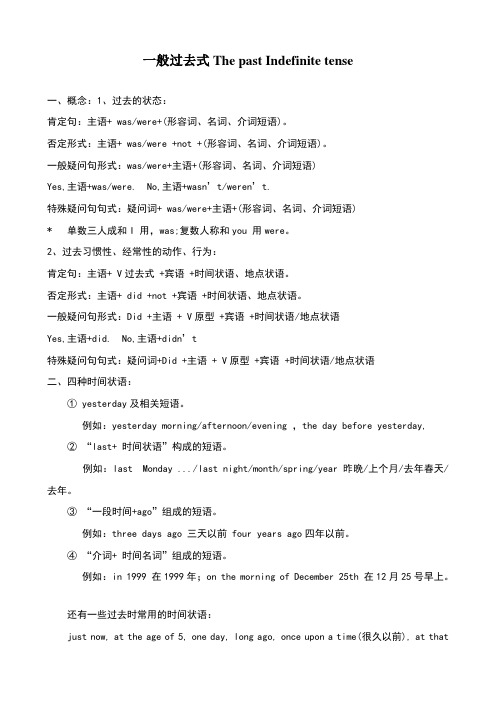
一般过去式The past Indefinite tense一、概念:1、过去的状态:肯定句:主语+ was/were+(形容词、名词、介词短语)。
否定形式:主语+ was/were +not +(形容词、名词、介词短语)。
一般疑问句形式:was/were+主语+(形容词、名词、介词短语)Yes,主语+was/were. No,主语+wasn’t/weren’t.特殊疑问句句式:疑问词+ was/were+主语+(形容词、名词、介词短语)* 单数三人成和I 用,was;复数人称和you 用were。
2、过去习惯性、经常性的动作、行为:肯定句:主语+ V过去式 +宾语 +时间状语、地点状语。
否定形式:主语+ did +not +宾语 +时间状语、地点状语。
一般疑问句形式:Did +主语 + V原型 +宾语 +时间状语/地点状语Yes,主语+did. No,主语+didn’t特殊疑问句句式:疑问词+Did +主语 + V原型 +宾语 +时间状语/地点状语二、四种时间状语:① yesterday及相关短语。
例如:yesterday morning/afternoon/evening ,the day before yesterday,② “last+ 时间状语”构成的短语。
例如:last Monday .../last night/month/spring/year 昨晚/上个月/去年春天/去年。
③ “一段时间+ago”组成的短语。
例如:three days ago 三天以前 four years ago四年以前。
④ “介词+ 时间名词”组成的短语。
例如:in 1999 在1999年;on the morning of December 25th 在12月25号早上。
还有一些过去时常用的时间状语:just now, at the age of 5, one day, long ago, once upon a time(很久以前), at thattime,before, a few days ago, when,the other day(前几天),When I was 8 years old (当我八岁时…),etc.三、过去时用法:① 表示在过去某个时间发生的动作或情况。
英语一般过去时语法知识讲解
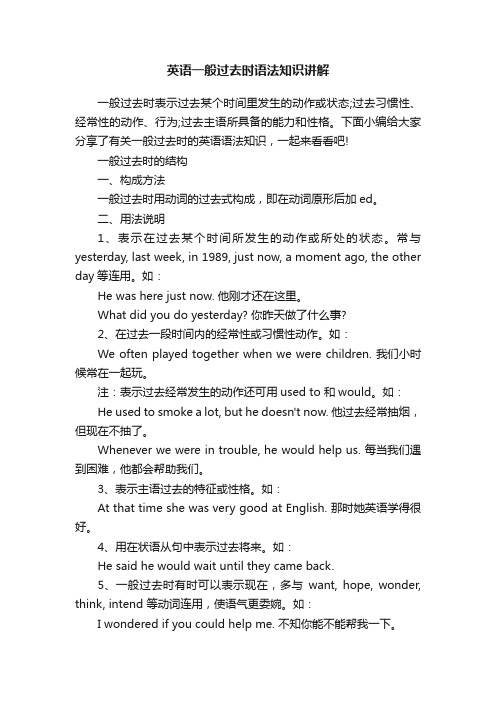
英语一般过去时语法知识讲解一般过去时表示过去某个时间里发生的动作或状态;过去习惯性、经常性的动作、行为;过去主语所具备的能力和性格。
下面小编给大家分享了有关一般过去时的英语语法知识,一起来看看吧!一般过去时的结构一、构成方法一般过去时用动词的过去式构成,即在动词原形后加ed。
二、用法说明1、表示在过去某个时间所发生的动作或所处的状态。
常与yesterday, last week, in 1989, just now, a moment ago, the other day等连用。
如:He was here just now. 他刚才还在这里。
What did you do yesterday? 你昨天做了什么事?2、在过去一段时间内的经常性或习惯性动作。
如:We often played together when we were children. 我们小时候常在一起玩。
注:表示过去经常发生的动作还可用used to 和would。
如:He used to smoke a lot, but he doesn't now. 他过去经常抽烟,但现在不抽了。
Whenever we were in trouble, he would help us. 每当我们遇到困难,他都会帮助我们。
3、表示主语过去的特征或性格。
如:At that time she was very good at English. 那时她英语学得很好。
4、用在状语从句中表示过去将来。
如:He said he would wait until they came back.5、一般过去时有时可以表示现在,多与want, hope, wonder, think, intend 等动词连用,使语气更委婉。
如:I wondered if you could help me. 不知你能不能帮我一下。
6、有时用一般过去时也是时态一致的需要。
高中英语语法一般过去时详细讲解
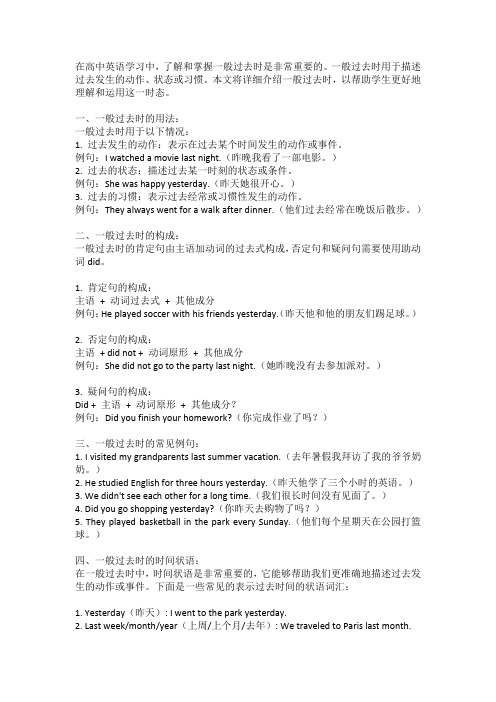
在高中英语学习中,了解和掌握一般过去时是非常重要的。
一般过去时用于描述过去发生的动作、状态或习惯。
本文将详细介绍一般过去时,以帮助学生更好地理解和运用这一时态。
一、一般过去时的用法:一般过去时用于以下情况:1. 过去发生的动作:表示在过去某个时间发生的动作或事件。
例句:I watched a movie last night.(昨晚我看了一部电影。
)2. 过去的状态:描述过去某一时刻的状态或条件。
例句:She was happy yesterday.(昨天她很开心。
)3. 过去的习惯:表示过去经常或习惯性发生的动作。
例句:They always went for a walk after dinner.(他们过去经常在晚饭后散步。
)二、一般过去时的构成:一般过去时的肯定句由主语加动词的过去式构成,否定句和疑问句需要使用助动词did。
1. 肯定句的构成:主语+ 动词过去式+ 其他成分例句:He played soccer with his friends yesterday.(昨天他和他的朋友们踢足球。
)2. 否定句的构成:主语+ did not + 动词原形+ 其他成分例句:She did not go to the party last night.(她昨晚没有去参加派对。
)3. 疑问句的构成:Did + 主语+ 动词原形+ 其他成分?例句:Did you finish your homework?(你完成作业了吗?)三、一般过去时的常见例句:1. I visited my grandparents last summer vacation.(去年暑假我拜访了我的爷爷奶奶。
)2. He studied English for three hours yesterday.(昨天他学了三个小时的英语。
)3. We didn't see each other for a long time.(我们很长时间没有见面了。
一般过去时讲解
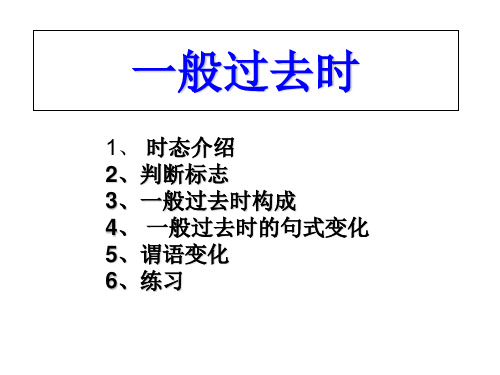
Yes,you did.
Yes,I did.
Yes,he/she/it did.
work
No,you did not. Did we work?
No, I did not. No,he/she/it did not. Did you work? Did they work?
Yes,we/you did. Yes,we did. Yes,they did. No,we/you did not. No,we did not. No,they did not.
•
时
•
be动词(was,were)
•
助动词(did)
主语+谓语 •
•
情态动词(could,might) 实义动词(有确切含义的动词,可
以单独做谓语,如:played
•
等)
例如:
• They were happy.
• He played football.
• You did your homework.
Was there a/ any…? there Yes,there was.
Were there any…? Yes,there were.
be No,there was not.
No,there were not.
返回上页 返回首页
1.肯定句:主语 + 行为动词过去式 be动词过去式(was / were)
e.g. We played football yesterday. I was in the office last night. He couldn’t swim 10 years ago.
2.否定句 did not / didn’t + 行为动词原形 was not / wasn’t + 其他成分 were not / weren’t + 其他成分
一般过去时讲解及练习
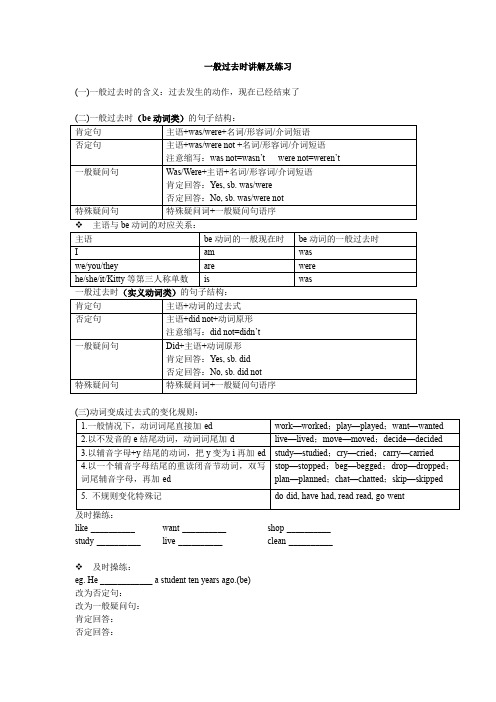
一般过去时讲解及练习(一)一般过去时的含义:过去发生的动作,现在已经结束了一般过去时(实义动词类)的句子结构:及时操练:like-__________want-__________shop-__________ study-__________live-__________clean-__________❖及时操练:eg. He ____________ a student ten years ago.(be)改为否定句:改为一般疑问句:肯定回答:否定回答:对ten years ago划线提问:(四)一般过去时的时间标志词1. yesterday昨天系列:yesterday昨天,yesterday morning昨天早上,the day before yesterday 前天2. last上一个系列:last year去年,last month上个月,last week上周3. ago以前系列:two minutes ago两分钟前, three hours ago三小时前, four days ago四天前4. just now刚才(五)一般过去时(be动词类)练习:I. 用所给词的适当形式填空1. I __________ at home just now. (be)2. They __________ happy last week. (be)3. She __________ a student ten years ago. (be)4. The old man __________ at church yesterday. (be)II. 按要求改写句子:1. I was at home just now. (改成否定句)I __________ __________ at home just now.2. They were happy last week. (改成一般疑问句)__________ __________ happy last week?3. She was a student ten years ago. (改成否定句)She __________ __________ a student ten years ago.4. The old man was at church yesterday. (对划线部分提问)__________ __________ the old man at church ?(七)一般过去时(实义动词类)练习:I. 用所给词的适当形式填空1. I _________ (have) an exciting party last weekend.2. _________ she _________(practice) her guitar yesterday? No, she _________.3. What ________ Tom ________ (do) on Saturday evening?He ________(watch) TV and __________(read) an interesting book.4. They all _________(go) to the mountains yesterday morning.5. She _________(not visit) her aunt last weekend.She ________ (stay) at home and _________(do) some cleaning.II. 按要求改写句子1. Lucy did her homework at home.(改否定句)Lucy ________ _______ her homework at home.2. He found some meat in the fridge.(变一般疑问句)___________ he __________ ___________ meat in the fridge?3. They studied English last year.(变一般疑问句)_______ they _______ English last year?4. Frank read an interesting book about history. (一般疑问句)_______ Frank _______ an interesting book about history?5. My family went to the beach last week. (划线提问)________ ________ ________ family _______ last week?。
(完整版)一般过去时的讲解
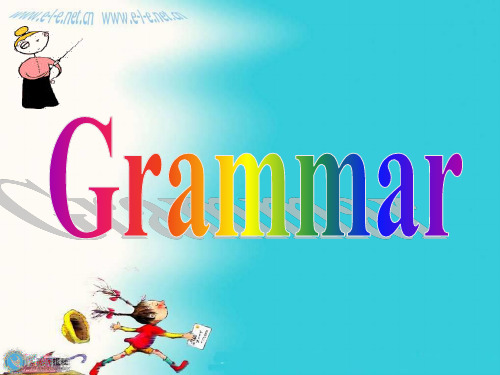
• 1.He visited his friends last night. .否定句He didn’t visit his friends last night. • 疑问句:Did he visit his friends last night? • 肯定回答:Yes, he did. • 否定回答:No, he didn’t. • 对划线提问:What did he do last night? • 对划线提问:When did he visit his friends?
3、/t/ /d/ 之后念 /id/ , 即 ed 在 /t/ /d/ 音后 面念 /id/ 例:wanted shouted needed counted
◆不规则变化(需逐个记忆): do — did come — came go — went sit — sat have — had can — could take — took give — gave put— put get — got swim — swam eat — ate tell— told sleep — slept see — saw wear — wore lie — lay drink — drank find — found write — wrote can — could will — would sing — sang read — read
★时标:always usually often sometimes never every day on Sundays
◆现在进行时:句中动词用am/is/are +doing 形式,表示现在正在进行的动作。
★时标: now at the moment listen look do sth. at+具体时刻 It’s+具体时刻
一般过去时讲解PPT课件

did
助动词,用于构成一般过去时的 疑问句和否定句。
主语
句子中的动作执行者,可以是名 词、代词等。
例如
What did you do yesterday? 你 昨天做了什么?
其他成分
包括宾语、状语等,根据句子需 要而定。
动词原形
指动词的基本形式,即不加任何 时态或语态标记的形式。
特殊疑问句实例分析
when、after、 before、as等引导的 表示过去的时间状语 从句。
已经、曾经、刚才、 那时等表示过去的时 间副词。
02
一般过去时肯定句结构
主语+动词过去式+其他成分
01
02
03
主语
句子中的主体,可以是人 、物或抽象概念。
动词过去式
表示过去某个时间里发生 的动作或状态。动词的过 去式可分为规则变化和不 规则变化两种。
表示过去某个时间里发生的动 作或状态。
用法
陈述过去的事实或情况,描述 过去经常或反复发生的动作。
现在完成时
表示过去发生的动作对现在造 成的影响或结果,或从过去已 经开始,持续到现在的动作或 状态。
用法
强调过去与现在的联系,表达 一个动作从过去一直延续到现
在。
两者在时间状语上的区别
01
02
03
04
一般过去时
一般过去时讲解PPT课件
目录 Contents
• 一般过去时基本概念 • 一般过去时肯定句结构 • 一般过去时否定句结构 • 一般过去时疑问句结构 • 一般过去时特殊疑问句结构 • 一般过去时与现在完成时的比较
01
一般过去时基本概念
定义与作用
定义
一般过去时表示过去某个时间里 发生的动作或状态。
一般过去时讲解及答案

一般过去时讲解及答案一、巧记一般过去时:动词一般过去时,表示过去发生的事;be用was或用were, have,has变had;谓语动词过去式,过去时间作标志;一般动词加-ed,若是特殊得硬记。
否定句很简单,主语之后didn’t添;疑问句也不难,did放在主语前;不含be动词时如果谓语之前有did,谓语动词需还原;动词若是was,were,否定就把not添。
含be动词时疑问句也不难,要把was,were放在主语前。
二、be的一般过去时:学习动词be的一般过去时,下面有一口诀,它可以帮你们更好地掌握动词be的一般过去时。
be的过去时有四巧:一是时间状语巧,表示过去的短语要记牢;二是形式巧,单数was,复数were;三巧是否定句结构,not紧跟was/were;四是疑问句式巧,was/were向前跑(提前)。
【一巧】时间状语(即标志词)巧。
一般过去时表示过去发生的动作或存在的状态,恰巧与表示过去的一些时间状语连用。
【二巧】形式巧。
它与一般现在时一样,形式多样:当主语是第一人称单数或第三人称单数时,谓语动词用was;主语是第二人称或其他人称复数时,谓语动词用were。
例如: I was in the classroom yesterday morning.昨天早上我在教室里。
He was at school last Tuesday.上周二他在学校。
They were over there a moment ago.刚才他们在那边。
【三巧】否定句结构巧。
与动词be的一般现在时一样,它在动词后面加not即可变成否定句,并且was, were与not可以缩写成wasn't, weren't。
即:主语+ wasn't/ weren't +表语+其他。
例如:I was not (=wasn't) here yesterday.昨天我不在这儿。
My parents were not (=weren't) at home last Sunday.上周日我父母不在家。
一般过去时讲解

05
一般过去时的注意事项
避免与现在完成时的混淆
01
区别动作发生的时间点
一般过去时表示过去某个时间发生的动作或存在的状态,而现在完成时
强调的是动作从过去一直持续到现在,可能还会持续下去。
02 03
注意时间状语的运用
一般过去时通常与表示过去的时间状语连用,如yesterday、last year 等,而现在完成时则常与表示现在的时间状语连用,如so far、up to now等。
在描述历史事实中的应用
描述历史事件,例如“The Declaration of Independence was signed in 1776”(《独立宣言》于 1776年签署)。
描述历史人物的行为或遭遇,例如“Napoleon Bonaparte conquered much of Europe in the early 19th century”(拿破仑·波拿巴在19世纪初征服了欧洲的大部分地区)。
一般过去时讲解
目录
• 一般过去时的定义 • 一般过去时的动词变化 • 一般过去时的句型结构 • 一般过去时的语境应用 • 一般过去时的注意事项
01
一般过去时的定义
什么是一般过去时
01
一种描述过去发生的动作或状态 的时态。
02
表示过去某个时间点、某段时间 或某个情境下的动作或状态。
一般过去时的语法形式
动词时态的一致性
在描述一系列动作时,应注意保持动词时态的一致性,避免混淆。
注意时间状语的使用
准确运用时间状语
使用一般过去时需要准确选择和运用 时间状语,如使用ago表示过去的某 个时间点,使用just now表示刚刚发 生的动作。
避免使用模糊的时间状语
一般过去时讲解
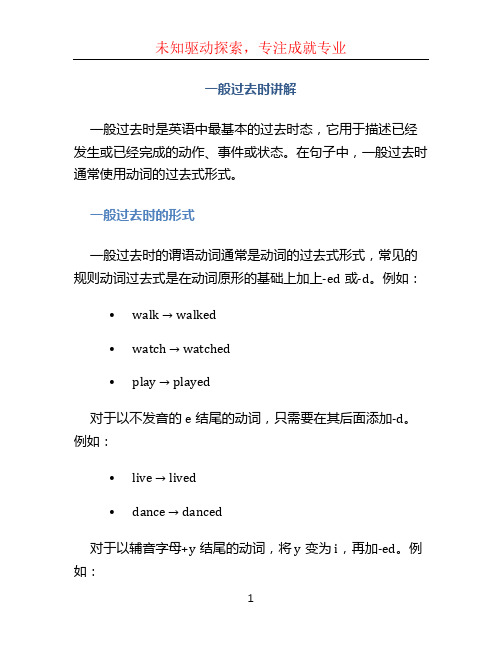
一般过去时讲解一般过去时是英语中最基本的过去时态,它用于描述已经发生或已经完成的动作、事件或状态。
在句子中,一般过去时通常使用动词的过去式形式。
一般过去时的形式一般过去时的谓语动词通常是动词的过去式形式,常见的规则动词过去式是在动词原形的基础上加上-ed或-d。
例如:•walk → walked•watch → watched•play → played对于以不发音的e结尾的动词,只需要在其后面添加-d。
例如:•live → lived•dance → danced对于以辅音字母+y结尾的动词,将y变为i,再加-ed。
例如:•study → studied•try → tried对于以短元音字母结尾的重读闭音节动词,需要先双写最后一个辅音字母,再加-ed。
例如:•stop → stopped•plan → planned不规则动词的过去式需要特殊记忆。
例如:•go → went•have → had•say → said一般过去时的用法1.描述过去的动作或事件一般过去时常用于描述过去发生的动作或事件。
例如:–I walked to the park yesterday.(我昨天走到了公园。
)–They played soccer last weekend.(他们上个周末踢了足球。
)2.描述过去的习惯或常态一般过去时还可用于描写过去的习惯或常态,表示过去经常发生的动作或状态。
通常会和表示频率的副词或状语连用,如often(经常)、usually(通常)、always (总是)等。
例如:–He often visited his grandmother when he lived in the city.(他住在城市时经常去看他的奶奶。
)–I always went to bed early when I was a child.(我小时候总是很早就睡觉。
)3.用于虚拟语气一般过去时也可用于虚拟语气,表示对现在或将来的假设或建议。
完整版)一般过去时讲解及练习

完整版)一般过去时讲解及练习一般过去时是用来描述在确定的过去时间里所发生的动作或存在的状态。
常见的时间状语有yesterday、an hour ago、the other day、XXX、last night/week/month/year、a moment ago、a week ago、three years ago、just now和in the past等。
例如:“Where did you go just now?”(你刚才去哪了?)。
一般过去时的谓语动词形式为动词的过去式,一般在动词原形后加-ed。
例如:“I was tired last night.”(昨天晚上我很累)和“XXX.”(昨天我们参观了那个博物馆)。
一般过去时的构成有两种方式。
第一种是用was/were+形容词/名词等。
例如:“I was XXX.”(昨天我在家)和“Mr.Green was not a teacher last year.”(去年XXX不是一个老师)。
系动词be的过去式为am/is→was、are→were。
第一人称单数(I)和第三人称单数(he/she/it)用was,第二人称单数(you)和各人称复数(we/you/they)用were。
第二种是用实义动词的过去式+其他成分。
例如:“XXX.”(我妈妈昨天去购物了)和“His uncle worked in Beijing in 2014.”(他叔叔2014年在北京工作)。
一般过去时的句式有三种。
肯定句的形式是主语+was/were+其他或主语+实义动词的过去式+其他。
例如:“XXX.”(上周日我去探望了爷爷)和“I was not at school at this time yesterda y.”(昨天的这个时候我没在学校)。
否定句的形式是主语+did+not+实义动词的原形+其他。
例如:“XXX.”(上周我什么都没买)。
疑问句的形式是Was/Were+主语+其他?例如:“Was she at home yesterday?”(昨天她在家吗?)Did you have a good time last weekend。
一般过去时讲解

一般过去时的讲解1.概述一般过去时表示过去某个时间发生的动作或状态,常和表示过去的时间连用,yesterday, last night, in 1990, two days ago等。
也表示过去经常或反复发生的动作,常和often, always 等表示频度的时间状语连用。
I got up at 6:30 yesterday.我昨天6:30起床。
He always went to work by bus last year.去年他总是坐公交车上班。
2.一般过去时的构成一般过去时由规则动词(-ed/-d)或不规则动词的过去时表示,除be外,其余动词没有人称和数的变化。
各种动词的否定结构和一般疑问结构,与一般现在时的否定结构和疑问结构相同。
3.Be动词在一般过去时中的变化:⑴am 和is在一般过去时中变为was。
(was not=wasn’t)⑵are在一般过去时中变为were。
(were not=weren’t)⑶带有was或were的句子,其否定、疑问的变化和is, am, are一样,即否定句在was 或were后加not,一般疑问句把was或were调到句首。
4.句中没有be动词的一般过去时的句子否定句:didn’t +动词原形,如:Jim didn’t go home yesterday.一般疑问句:在句首加did,句子中的动词过去式变回原形。
如:Did Jim go home yesterday?特殊疑问句:⑴疑问词+did+主语+动词原形?如:What did Jim do yesterday?⑵疑问词当主语时:疑问词+动词过去式?如:Who went to home yesterday?5.规则动词过去式变化规则(1)一般在动词末尾加-ed,如:play-played, cook-cooked(2)结尾是e加d,如:like-liked love-loved(3)末尾只有一个元音字母和一个辅音字母的重读闭音节,应双写末尾的辅音字母,再加-ed,如:stop-stopped(4)以“辅音字母+y”结尾的,变y为i,再加-ed,如:study-studied6.一般过去时的用法(1)表示过去某个特定时间发生的动作或存在的状态常有明确的时间状语,如yesterday,last night, some years ago,in1890等,以及由when等引导的时间状语从句。
一般过去时讲解

一般过去时讲解
一般过去时的常见错误
时态不一致:在描述过去的事情时,容易将一些动作的时态与一般过去时不一致,导 致意思表达不清或产生歧义 动词形式错误:在使用一般过去时的时候,容易将动词的形式拼写错误或使用不当, 导致句子意思错误或语法错误
写作练习:通过写作练习来巩固一般过去时的运用。可以写日记、故事、短文等,记 录过去发生的事情,用一般过去时描述动作和状态。在写作过程中,注意时态的准确 性和语法的规范性
一般过去时讲解
口语练习
在口语练习中,尝试使用一般过去 时来描述过去的事情,表达对过去 的看法和回忆。可以通过模拟对话、 角色扮演等方式进行练习,提高对
pmห้องสมุดไป่ตู้ 我们原本打算下午3点在
火车站见面
03
表示过去的虚拟语气
在表示与现实相反的情况时, 可以使用一般过去时,表示虚 拟语气。例如:If I had known the answer, I would have told you. 如果我知道 答案的话,早就告诉你了。 (实际上不知道答案)
04
表示对过去的推测
在表示对过去的推测时,可以 使用一般过去时。例如:It must have rained last night, because the ground is wet. 昨晚一定下雨了,因 为地面是湿的
一般过去时讲解
一般过去时的其他注意事项
注意动词时态的一致性:在使用一般过去时的时候,要注意句子中其他动词的时态与 之一致。例如,在描述过去发生的事情时,所有的动作都应使用过去时态,除非有特 殊需要使用其他时态 注意动词的形式:在一般过去时中,动词需要使用其过去式形式。不同形式的动词过 去式有不同的拼写和发音,需要注意正确使用 注意时间状语的搭配:在使用一般过去时的时候,要与适当的时间状语进行搭配。例 如,"yesterday"应与一般过去时搭配使用,"tomorrow"应与一般将来时搭配使用
一般过去时讲解

一般过去时讲解一般过去时是用来描述过去某一时间内发生的动作或状态,以及过去惯性、反复性的动作。
通常与表示过去的时间状语连用,如yesterday昨天、XXX昨晚、last week上周、last year去年等。
谓语动词要使用动词的过去式。
例如,现在时的句子“XXX”中的动词“walks”表示目前惯性、经常性的动作,而过去时的句子“XXX”中的动词“walked”表示过去的某一时间,如昨天、上周或学生时代等过去的某一时间。
一般过去时的构造包括be动词的过去式,其中am与is的过去式是was,are的过去式是were。
肯定句的构造为主语+be动词的过去式(was/were),否定句的构造为主语+be动词的过去式(was/were)+not,疑问句的构造为be动词的过去式(was/were)+主语+。
例如,肯定句“He was busy XXX”表示他昨天很忙,否定句“He was not busy XXX”表示他昨天不忙,疑问句“XXX?”表示他昨天忙吗?对于be动词的现在式和过去式,XXX的句型用于一般过去时需要把is、are变为它们的过去式,即There was/were。
例如,现在时的句子“There is a book on the table”在一般过去时中变为“There was a book on the table”。
否定句的构造和现在时一样,只需在be动词过去式(was/were)后面加上not。
否定式的was not、were not通常使用缩写形式wasn’t和weren’t。
例如,“XXX”表示前几天我不忙。
2.以e结尾的动词,直接加-d。
live→XXX→moved3.以辅音字母+y结尾的动词,变y为i,再加-ed。
study→XXX→XXX→XXX4.一些不规则动词的过去式需要记忆。
go→XXX→XXX→ate练题一、用动词的适当形式填空1.She_______(watch)TV last night.2.They________(play)XXX.3.We________(visit)the museum last weekend.4.He________(study)hard for the exam.5.I________(have)breakfast at 7 o’clock this morning.6.She________(not。
一般过去时讲解已改
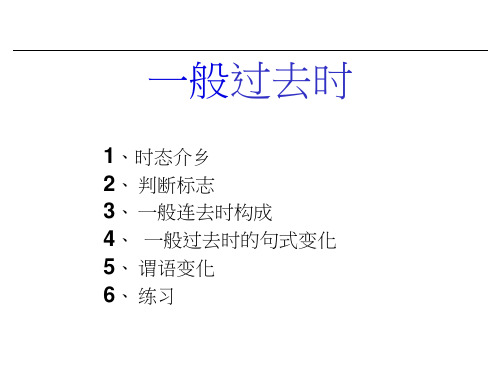
一般过去时1、时态介乡2、判断标志3、一般连去时构成4、一般过去时的句式变化5、谓语变化6、练习1.定义:(用法1)一般过去时态表示过去某个时间发生的动作或存在的状态,常和表示过去的时间状语连用;例句:I got up a/t 7:00 yes terday.My father was at work yesterday afternoon(用法二)也表示过去经常或反复发生的动作,常和表示频度的时间状语连用。
例句:He always went to work by bus last year.(含有频度副词:often always等,但全要还是含肴过去时间状语)2、一般过去时的判断标志:明确的过去时间状语1 •与ago连用? a moment two minutes three hours z five days one week six months 丿four years4•与one连用:morning evening©ne day、Monday afternoon5•与that连用:that morning winter day year6•其他时间状语:Just now in the old days inthose days in 1980 th® ©therd@# at that tiim once upon atime3、一般过去时的构成所有时态都是通过动词变化来表现的• E.g.•You are right.•一般现在时•I want to go to school.We are doing our housework nowThe bus is leaving at 8:oo.正在进行be 动词(was,were)助动词(did)(could,might)情态实义动词侑确切含义的动词,可以单独做谓语,如:played)•They were happy.•He played football.•You did your homework.主语+谓语■例如:4、一般过去时句式变换Ait去瞒旬武am疑问句式1•肯定句:主语+行为動闽过去式be 动词过去式(was / were)e.g> We played football yesterday.返回上页 返回首页I was in the office last night. He couldn^tswim 10 years ago.2•否定句did not / didn,t +行为动词原形was not / wasn^t + 其他成分were not / weren^t + 其他成分e.g. I was not in the office last night.I didn't sing a song at Kangkang's party.I didn't play video games.3. 一般疑问句did +主语+行为动词原形was / were +主语+其他成分eg. - Did you go shopping yesterday? -Yes, I did. / No, I didn't.・Was she 15 years old last year?4. 特殊疑问句特殊疑问词+did +主语+行为动词原形特殊疑问词+was / were +主语+其他成分eg. - Did you go shopping yesterday?When and where were you born?5、谓语变化规则动词过去式的构成构成规则1. 一般在动词原形末尾加・ed look lookedplay playedstart started2.结尾是e的动词加-d live livedhope hopeduse used3.末尾只有一个辅音字母的重读stop stopped闭音节词,先双写这个辅音字plan planned母,再加-ed trip tripled4.结尾是“辅音字母+y”的动词,study studied先变“y”为“i”再加-ed carry carried规则动词・ed的读音•说明:• 1、清念/V ,即ed在清辅音后面念1X15•例:finished helpedpassed cooked•元浊/d/,即ed在元音,浊辅音后面念/d/,例:borrowed enjoyedcalled moved•、/t/ /d/ 之后念/id/ 5即ed在/t/ /d/音后面念/id/例:wanted shouted needed counted不规则动词的过去式grow — grew know — knewthrow - threw blow — blew write — wrote drive ― drove ride — rode get - got forget — forgot lend — lent send — sent spend — spent say — said */sed/ pay — paid stand — stood understand — understood let — let put — put cut — cut read ■- read^am, is “ was are — were do — did go“ went have — had see ― saw can — could may — might dig — dug eat — ate find — found make — made hear — heard run —ran take — took hold — held speak - spoke leave ― leftkeep — kept sleep — slept sweep — swept tell — told sell — sold begin — began sing — sang sit — sat swim — swam ring — rang give — gave bring ― brought buy “ bought think - thought teach - taught catch - caught come — came become — became写出下列动词的过去式:go went use used run ranthink thought live lived borrow borrowed be was/ were wake woke grow grew happen happened keep kept watch watched give gave say said write wrote become became clean cleaned smile smiled get got buy bought open opened rain rained play played begin began stay stayed learn learnt/ed swim swam pass passed see saw carry carried answer answered read read study studiedstop stopped finish finished6、Exercises•山•句型转换一They came to China in 1990.(变一般疑问句)•Did theRme to China in 1990?•2」was ill for two days last week?(同上)•"g厂g you ill for two days last week?• 3. The twins go to school on foot every day.(同上)•Do the twins go to school on foot every day?• 4.She washed the clothes last Sunday.(变否定句)•She didn't wash the clothes last Sunday5. She is going to go shopping tomorrow.(变否定She isn't qoinq to qo shoppinq tomorrow.6. My mother likes her students.(变一般疑问句)Does you厂mother like her students?7. D o you watch TV on Sunday?(用last Sunday 改写成过去时态的句子)Did you watch TV last Sunday?.Wei Hua bought a new pen yesterday・(变否定She didn牛buy a new pen yesterday.用括号里动词的适当形式填空。
- 1、下载文档前请自行甄别文档内容的完整性,平台不提供额外的编辑、内容补充、找答案等附加服务。
- 2、"仅部分预览"的文档,不可在线预览部分如存在完整性等问题,可反馈申请退款(可完整预览的文档不适用该条件!)。
- 3、如文档侵犯您的权益,请联系客服反馈,我们会尽快为您处理(人工客服工作时间:9:00-18:30)。
写出下列动词的过去式:
go think be happen give become get rain stay pass answer
went thought was/ were happened gave became got rained stayed passed answered
use live wake keep say clean buy play learn see read stop
5、谓语变化
规则动词过去式的构成 构成规则 1. 一般在动词原形末尾加-ed look play start live hope use stop plan trip 例词 looked played started lived hoped used stopped planned tripped studied carried
opened began swam carried studied finished
巧记动词过去时态
动词一般过去时,表示过去发生事; be用was或用were, have,has变had; 谓语动词过去式,过去时间坐标志; 一般动词加-ed,若是特殊得硬记。 否定句很简单,主语之后didn’t添; 疑问句也不难,did放在主语前; 如果谓语之前有did,谓语动词需还原; 动词若是was,were,否定就把not添。
• • •
•
一般现在时
We are doing our housework now.
正在
The bus is leaving at 8:00.
进行 时
• • 主语+谓语
be动词(was,were) 助动词(did) 情态动词(could,might) 行为动词eg:played
eg: • They were happy. • He played football. • You did your homework.
返回上页 返回首页
疑 问 句 式 和 简 略 答 语 第一人称 第二人称 第三人称
1.肯定句:主语 +
行为动词过去式 be动词过去式(was / were) e.g. We played football yesterday. I was in the office last night. He couldn’t swim 10 years ago. 2.否定句 did not / didn’t + 行为动词原形 was not / wasn’t + 其他成分 were not / weren’t + 其他成分 e.g. I was not in the office last night. I didn't sing a song at Kangkang's party. I didn't play video games.
just now in the old days in those days in 1980 the other day at that time once upon a time
3、一般过去时的构 成
所有时态都是通过动词变化来表现的
• E.g. • You are right. • • I want to go to school.
一般过去时
1、时态介绍 2、判断标志 3、一般过去时构成 4、一般过去时的句式变化 5、谓语变化 6、练习
1.定义:
(用法一) 一般过去时态表示过去某个时间发生的动 作或存在的状态,常和表示过去的时间状语连用; eg:I got up at 7:00 yesterday. My father was at work yesterday afternoon (用法二) 也表示过去经常或反复发生的动作,常和 表示频度的时间状语连用。 eg: He always went to work by bus last year. (含有频度副词: often always 等,但主要还是 含有过去时间状语)
5. She is going to go shopping tomorrow. (变否定 句) She isn’t going to go shopping tomorrow. ____________________________________ 6. My mother likes her students. (变一般疑问句) Does your mother like her students? ____________________________________ 7. Do you watch TV on Sunday? (用last Sunday 改 写成过去时态的句子) Did you watch TV last Sunday? ____________________________________ 8. Wei Hua bought a new pen yesterday. (变否定 buy didn’t 句) She ________ ________ a new pen yesterday.
• 元浊 /d/ ,即 ed 在元音, 浊辅音后面念 /d/ , 例:borrowed enjoyed called moved
• 、/t/ /d/ 之后念 /id/ , 即 ed 在 /t/ /d/ 音后面 念 /id/
例:wanted shouted needed counted
不规则动词的过去式
morning afternoon evening
the day before yesterday
4)与one 连用: morning evening on day e Monday afternoon 5)与that 连用: morning winter day year
that
6)其他时间状语:
.
2.一般过去时的判断标志:
1)与ago 连用: a moment two minutes three hours five days one week six months four years
ago
2)与last 连用
last
yesterday
3)与yesterday 连用:
time night week month term Monday
4、一般过去时句式变 换
一般过去时态句式的构成
陈述句式
动词 肯 定 式 I was …. He /She/it was…. be We/You/They were ….
I/You/He/She/It/We/
否 定 式 I was not(wasn’t)…. He/She/It was not(wasn’t)…. We/You/They were not (weren’t)…
3. 一般疑问句 did + 主语 +行为动词原形 was / were + 主语 +其他成分 eg. - Did you go shopping yesterday? -Yes, I did. / No, I didn’t. -Was she 15 years old last year? 4. 特殊疑问句 特殊疑问词 +did + 主语 +行为动词原形 特殊疑问词 +was / were + 主语 +其他成分 eg. - Did you go shopping yesterday? When and where were you born?
used lived woke kept said cleaned bought played learnt/ed saw read stopped
ran run borrow borrowed grew grow watch watched wrote write smiled smile
open begin swim carry study finish
I/You/He/She/It/We/You/They
did not(didn’t) work.
work You/They worked. there There were…. be
There was ….
There was not (wasn’t) …. There were not (weren’t)….
am, is -- was are -- were do -- did go -- went have -- had see -- saw can -- could may -- might dig -- dug eat -- ate find -- found make -- made hear -- heard run -- ran take -- took hold -- held speak -- spoke leave -- left keep -- kept sleep -- slept sweep -- swept tell -- told sell -- sold begin -- began sing -- sang sit -- sat swim -- swam ring -- rang give -- gave bring -- brought buy -- bought think -- thought teach -- taught catch -- caught come -- came become -- became grow -- grew know -- knew throw -- threw blow -- blew write -- wrote drive -- drove ride -- rode get -- got forget -- forgot lend -- lent send -- sent spend -- spent say -- said */sed/ pay -- paid stand -- stood understand -- understood let -- let put -- put cut -- cut read -- read*
